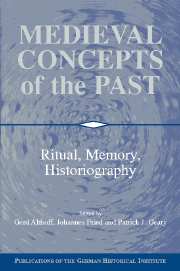Book contents
- Frontmatter
- Introduction
- 1 Authority and Legitimation of Royal Policy and Action: The Case of Henry II
- 2 King Henry II of Germany: Royal Self-Representation and Historical Memory
- 3 The Variability of Rituals in the Middle Ages
- 4 Rebels and Rituals: From Demonstrations of Enmity to Criminal Justice
- 5 Oblivion Between Orality and Textuality in the Tenth Century
- 6 Text and Ritual in Ninth-Century Political Culture: Rome, 864
- 7 The Concept of Time in the Historiography of the Eleventh and Twelfth Centuries
- 8 Constructing the Past by Means of the Present: Historiographical Foundations of Medieval Institutions, Dynasties, Peoples, and Communities
- 9 Topographies of Memory: Center and Periphery in High Medieval France
- 10 Challenging the Culture of Memoria: Dead Men, Oblivion, and the “Faithless Widow” in the Middle Ages
- 11 Artistic and Literary Representations of Family Consciousness
- 12 The Strange Pilgrimage of Odo of Deuil
- 13 The Rhineland Massacres of Jews in the First Crusade: Memories Medieval and Modern
- 14 The Martyr, the Tomb, and the Matron: Constructing the (Masculine) “Past” as a Female Power Base
- Index
12 - The Strange Pilgrimage of Odo of Deuil
Published online by Cambridge University Press: 05 January 2013
- Frontmatter
- Introduction
- 1 Authority and Legitimation of Royal Policy and Action: The Case of Henry II
- 2 King Henry II of Germany: Royal Self-Representation and Historical Memory
- 3 The Variability of Rituals in the Middle Ages
- 4 Rebels and Rituals: From Demonstrations of Enmity to Criminal Justice
- 5 Oblivion Between Orality and Textuality in the Tenth Century
- 6 Text and Ritual in Ninth-Century Political Culture: Rome, 864
- 7 The Concept of Time in the Historiography of the Eleventh and Twelfth Centuries
- 8 Constructing the Past by Means of the Present: Historiographical Foundations of Medieval Institutions, Dynasties, Peoples, and Communities
- 9 Topographies of Memory: Center and Periphery in High Medieval France
- 10 Challenging the Culture of Memoria: Dead Men, Oblivion, and the “Faithless Widow” in the Middle Ages
- 11 Artistic and Literary Representations of Family Consciousness
- 12 The Strange Pilgrimage of Odo of Deuil
- 13 The Rhineland Massacres of Jews in the First Crusade: Memories Medieval and Modern
- 14 The Martyr, the Tomb, and the Matron: Constructing the (Masculine) “Past” as a Female Power Base
- Index
Summary
Although Odo of Deuil's De profectione Ludovici VII in Orientem constitutes the only detailed report of the Second Crusade that we possess, no comprehensive analysis of the text itself exists. A consideration of the text's organizational structure has seemed unnecessary because the eyewitness perspective in which the events are presented attested to their authenticity. Because Odo himself declares that he intends merely to inform his abbot, Suger, about the events, leaving to the abbot the task of writing a life of Louis VII, it seemed possible to accept the events he presented as facts. Moreover, this monk of Saint Denis and pupil of Suger seemed to fit easily into a historiographical tradition that has been characterized as Capetian propaganda. Odo's biases therefore appeared easy to interpret. Consequently, the De profectione was classified as a secondrate student's work that reproduces a simplified version of Suger's concept of kingship. In the context of this classification only Odo's nationalism was considered original. It has been explained as a result of the crusade, where intercultural conflicts favored the development of a national consciousness. Following this argument, we are confronted with a medieval text that illustrates how national identity came into being on crusade.
- Type
- Chapter
- Information
- Medieval Concepts of the PastRitual, Memory, Historiography, pp. 253 - 278Publisher: Cambridge University PressPrint publication year: 2002

